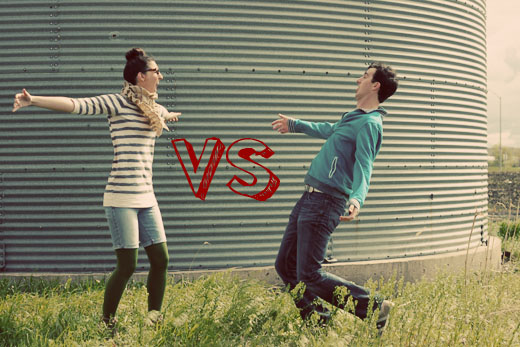Fighting Fair
Cathy asked that we write on the topic of conflict resolution. What a great idea! This fits right into one of our goals for this blog, which is to be completely open and honest with our readers. It's pretty easy to post about the great stuff that happens in our marriage and tell our happily-ever-after fairytale, or to talk about what we did over the weekend. My mind races past the bumps in the road, and I tend to think it wouldn't make good blog material. But the last thing I want is for people to think of us as a perfect couple. The truth about us is that we are far from it, and we are always trying to work on our flaws.
At times, of course, we end up disagreeing on things, or one of us (usually me) will say something stupid that will ignite a spark of emotion--either sad, hurt, anger or all of the above. So, what do we do when that happens? Let the fun begin...
Here's an example:
This video is slightly off script and totally made up, but also not too far from some of our recent disagreements.
Kels, you never put your dishes away after supper. You always leave everything on the counter and expect me to pick up after you.
Yikes. When I say something like that, Kels is quick to retaliate, but not with rational thought, just with vengeance in mind. Trying hard to not do this is one of the reasons we're still married.
Well, I have two blogs to manage and you always make me edit every post, and I work a lot harder than you do, so I don't have time to pick up after dinner.
Now. Let's unpack that conversation:
First of all, neither statement is true. When I use absolutes like never, always and everything, I have started a conflict. What I have learned over the years is that when I use absolutes with Kels, she gets mad! And then she throws rocks back at me. We weren't talking about blogging; I was asking her to put her dishes away after supper. Except I didn't say that. My approach was all wrong. She felt attacked and started playing defense. We then spend about 20 minutes trying to calm each other down and get back on the same page.
Immature, we know. This post is so hard to write.
At times like these, I refer back to the training I had in elementary school when I was on the conflict resolution committee. Oh yeah, we had clipboards and sashes and stood outside during recess to help mediate playground conflicts. It was legit. The one statement we asked each side to say was this: "When you ______, I feel _______; therefore, _______."
I never really understood that as a third-grader, but I remember it. I think it still rings true and could help Kels and I as we work through our differences. If we can remove the emotion from the conversation and try to get to the root of the problem, we both usually have an "aha!" moment, hug it out and move on.
3 things I have learned from experience:
- Just because I think something Kels does or says is funny, doesn't mean she meant it that way, and she might be offended if I laugh. (On the flip side, we must be able to laugh at ourselves.)
- If I am upset about something, approach is everything. The way I approach the conversation shapes the outcome. "Kels, I have something bugging me that we need to talk about" is a lot better than the example above.
- When approached with an attack, don't change the subject and blame or mock the other person. Work out one conflict without starting another.
This post was brutal to write and that is because we are so bad at fighting fair. We don't fight that much, but when we do, we are not very good at it. Writing this has been therapeutic for us both.
Any other advice on how to fight fair?

